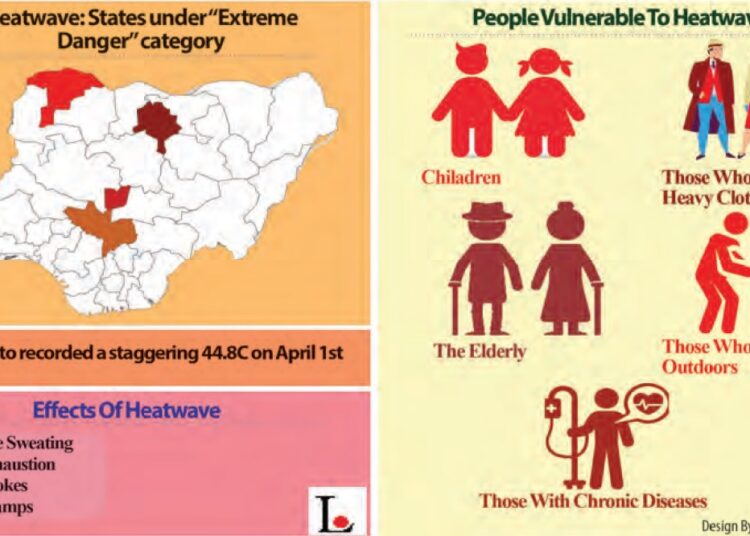Experts in the health sector have continued to express concern over the ongoing heatwave in most parts of the country whose impact has been exacerbated by poor electricity supply and increasing cost of energy, LEADERSHIP Data Miners learnt.
Since the beginning of this year, Nigeria has been grappling with extended periods of intense heat. The weather all over the country has been relatively hot for over two months. Even with sporadic rainfall, the impact of the heat wave is being felt. In fact, the Nigerian Meteorological Agency (NiMet) has warned that if safety precautions are not taken, Nigerians in Abuja, Kano, and many other northern states are likely to suffer heat strokes due to the scorching heatwave.
Heat stroke, also known as sunstroke, is a life-threatening condition that occurs when the body is unable to control its temperature. In its last advisory, NiMet categorised the 36 states into five levels of risk: normal, caution, extreme caution, danger, and extreme danger, based on the severity of anticipated heatwave.
It placed states such as Abuja, Kano, Sokoto and Kogi under the “extreme danger” category, and advised residents to take immediate precautionary measures to mitigate the risk of heat-related illnesses, including heat stroke.
Additionally, residents of states like Kebbi, Katsina, Adamawa and others are among those facing extreme danger, heightening concerns for widespread health implications.
For some states like Osun, Ekiti and Ondo which fall under the “Caution” category, NiMet advises residents to remain vigilant as the likelihood of heat strokes remains a concern, albeit to a lesser extent when compared to high-risk areas.
The warning comes amid a persistent heat wave that has gripped Nigeria for weeks, with temperatures soaring to nearly 40°C in certain regions. The scorching conditions have persisted, with Sokoto recording a staggering 44.8C on April 1.
According to Weather to Travel, in previous years, February typically saw temperatures in Lagos ranging from 85°F (30°C) at its peak to 78°F (25°C) at its lowest. In comparison, March, typically the hottest month, maintains similar temperatures, yet in March 2024 the mercury soared to unprecedented levels, reaching up to 39°C and nearly hitting 40°C.
An energy expert, Femi Opadokun said that as the heatwave brought some health risks, the poor electricity supply in the country and high energy cost have compounded the problems since alternatives are out of the reach of most.
He said, ‘‘Grid collapses, leading to a widespread blackouts, have occurred in the country for the second time amidst a heat wave. Blackouts have remained frequent, pushing many residents to depend on petrol and diesel generators to maintain cooling in their homes. However, soaring fuel prices over the past year have made these alternatives unaffordable for a significant portion of the population.’’
LEADERSHIP gathered that many Nigerians who can afford cooling systems in their homes are worried over their ability to power their Air Conditioners (AC), which a normal 220 KVA generator cannot power. According to an Abuja-based medical doctor, Dr Vivian Ojo, Nigerians are now more frustrated, as fans alone cannot save them from the impact of extreme heat and ACs that emerge as the sole remedy to the sweltering temperatures could not be powered due to energy supply deficit.
Considering the heatwave being experienced in the country, some stakeholders have called on Nigerians to take measures towards reducing methane emissions in the environment.
The stakeholders spoke yesterday in Port Harcourt at a one-day roundtable discussion on methane abatement in Nigeria, which was organised by the Environmental Centre for Oil Spills and Gas Flaring (ECOSGF) and the African Initiative for Transparency Accountability and Responsible Leadership (AfriTal).
Speaking at the event, AfriTal executive director, Dr Brown Ogbeifun, described methane as a major contributor to the current heatwave in the country.
Ogbeifun said: “Methane is a major contributor to the current heatwave in the country. This is because methane is 80 per cent more potent in trapping heat and carbon dioxide. What that means is carbon dioxide, for instance, can stay in the atmosphere for 100 years, but methane stays in the atmosphere for about 12 years.
“What that means, therefore, is that when it traps the heat, getting it released until it disperses, of course, is going to increase the wave of heat. It is going to increase the wave of temperatures, and that is why it is said that methane on its own causes about 40 per cent of global heat-related issues within the environment.
“I am sure that every Nigerian today sleeps and wakes up with heat. That should be of concern to everybody. It was not like that in the past. Some stakeholders have started to look at why this is now the case and started to pay attention to climate change as something that is real or more real than what people have projected. People now see that the destruction of the ecosystem is beginning to catch up with human beings.
“We need, therefore, to take control in terms of advocacy and in terms of trying as much as possible to manage our waste well as a way of reducing the short-term methane emissions within the atmosphere.”
Speaking at the event also, South-South Zonal Director of the National Environmental Standards and Regulations Enforcement Agency (NESREA), Nosa Aigbedion, said methane can be a harmful gas at an elevated level.
Aigbedion said: “Methane abatement is one that is of high concern to everyone. Methane is not a harmful gas at low levels, but at an elevated level, it becomes a thing of concern to everyone because of its ability to suppress oxygen and reduce what we take in as our daily life’s breath, which is oxygen.
“So, for that reason, there is a need for us to abate or curtail methane production and reduce its emission into the atmosphere. That is the crux of this discussion. By reducing anthropogenic (human) activities that lead to methane production, we need to ensure that waste management process does not produce methane.
“We also need to ensure that we reduce indiscriminate dumping of waste in our dumpsites. This is because sometimes methane production is very natural, through the decomposition of organic materials.”
Also, an environmental expert, Engr. Ibrahim Kolawole Muritala, said individual and community actions are needed to reduce carbon emissions and promote climate resilience. Muritala said assuaging heat waves and addressing the broader impacts of climate change require a collaborative effort.
In February, Vincent Weli, the director of weather forecast services at NiMet, suggested declaring a state of emergency in regions hardest hit by the heatwave. He recommended that workers be permitted to take breaks from noon to 3pm to mitigate the impact.
Speaking on a TV programme, Weli highlighted the potential adverse effects on cognitive development and productivity due to the high temperatures, emphasising the need for precautionary measures.
Experts have said that high dust concentration coupled with excessive heat posed a significant risk. Factors such as erratic power supply and inadequate ventilation could exacerbate the situation if not properly addressed.
They are worried that despite these warnings, state governments have yet to issue directives addressing the situation, lamenting the lack of seriousness among many Nigerian state governments towards weather and climate information.
A farmer, Moses Adamu said that the heatwave also threatens agricultural productivity, a sector critical to Nigeria’s economy. He said, ‘‘Heat stress on crops and livestock could significantly reduce yields and output. Physiological processes in plants, such as photosynthesis and water uptake, may be disrupted, leading to wilting, scorching, and diminished yields. Livestock may experience reduced feed intake, weight gain, and reproductive performance, along with mortality risks if adequate mitigation measures are not implemented.
The national secretary of the All Farmers Association of Nigeria, Yunusa Halidu, anticipates reduced productivity this year due to the extreme heat. He acknowledges the role of global warming and stresses the importance of mitigating its effects through proactive measures.
LEADERSHIP Data Miners’ findings showed that while several factors contribute to global warming, the current situation is largely attributed to climate change and heatwave is a prominent consequence, causing excessive sweating and fluid loss, potentially leading to dehydration.
The findings also revealed that heat waves can trigger heat-related illnesses such as heat exhaustion, heat strokes, and heat cramps while vulnerability to these effects varies among individuals; the elderly, children, outdoor workers and those with chronic illnesses are at higher risk.
Corroborating the findings of the research, a physician, Dr. Chioma Nwakanma-Akanno told LEADERSHIP that the heatwave in Nigeria is being caused by climate-related issues.
Nwakanma-Akanno listed children, persons living with disabilities like the albino community, and elderly and pregnant women as people mostly vulnerable to the heatwave.
She lamented that the heat wave currently experienced in Nigeria, coupled with high cost of energy, could expose many Nigerians to heat cramps, heat exhaustion, heat stroke and even hyperthermia, irritability, lack of concentration, headaches, loss of ability to do skilled tasks or heavy work, and even death.
She however advised Nigerians to sit outdoors in the shade or to open their windows to try and keep cool.
“We should take precautions such as drinking water regularly, using shade when outdoors and wearing a hat. Where possible, avoiding being outdoors during the hottest time of the day in the afternoon is advised,” she added.
“Once the human body’s physiological capacity to cope with increased heat stress is exceeded, the risks of functional failure, disease exacerbation and death rise rapidly. If the body temperature rises above 38°C, physical and cognitive functions are impaired; above 40.6°C, risks of organ damage, loss of consciousness, and death increase sharply.
“At high temperatures, displacement of blood to the surface of the body may lead to circulatory collapse. Heatwave can cause mortality and hospitalisations due to hyperthermia and similar acute illness, and also by exacerbating pre-existing conditions such as cardiovascular and pulmonary illnesses,” Peter Nkashi Agan, from the department of Geography, University of Ibadan, said.
Agan said heat wave is exacerbated in urban environments by the urban heat island effect, caused by the concentration of concrete and asphalt surfaces, reduction of vegetation, and anthropogenic heat sources.
He said, “Urban temperatures can be as much as 8°C higher than the surrounding countryside, though typically the increase is more in the order of 3°C to 4°C. Increasing heat also contributes to smog formation and worsening air quality, both of which are evident problems in urban than rural environments.
“In urban environments, the effects of heat on air pollution may have a much larger effect on mortality and morbidity than the direct effects of heat stress.”
Agan however advised a better understanding of extreme heat and its impacts on human health which will provide a basis for heat awareness and implementation of a heat warning system in Nigeria.
“The effects of hot waves on health is a function of prolonged exposure to solar radiation and there is a need for more awareness on the usefulness of tree incorporation in our cities and parks to serve as shade to ambient workers. The implication is a reduction in the incidences of morbidity and mortality from heat waves,” he stated.
Also, Dr. Ejike Orji told LEADERSHIP that heat causes a lot of evaporation, saying if someone is in a place where the heat is very high, and humidity is very low, people lose water very easily and it causes dehydration and heat exhaustion.
He said this is based on prolonged exposure to high temperature and when someone is dehydrated, the blood will be fecal and it might lead to electrolyte imbalance.
“The other one is heat stroke; extreme heat can cause what we call heat stroke and this is a severe situation that requires immediate medical attention because it means that the body temperature internal regulation has failed.
“Some of the symptoms you will have, the person will be confused. There will be dizziness and the heartbeat will be very rapid. In some cases, the person may even have loss of consciousness.
“We also have the respiratory part of it; high temperature can cause poor air quality and during heat waves anybody that has respiratory problems, especially people who have asthma or chronic obstructive pulmonary disease (COP) will be at risk,” he explained.
Speaking further, Dr. Orji said, “There is something we call relative humidity; that is the amount of moisture within the ecosystem. Now when you are nearer the water body like a big ocean, the relative humidity around that area is very high because water vapour saturates that environment.
“For instance, the relative humidity in Lagos will be as high as 85 percent while that of Abuja can be as low as 40 percent because it’s not near any body of water. So if you are in Lagos, with the same level of heat, because of the relative humidity, you will feel uncomfortable but you won’t be losing water as much as somebody who is in Abuja..
“In a place like Abuja, you may be losing water and not knowing it; that is more dangerous. That is why it is much more dangerous in the northern part of the country.
In the same vein, the Lagos state government has observed the rate at which heat waves caused by the challenge of global warming are damaging the health of Nigerians such as dehydration, heat exhaustion, heat stroke and death.
The director (features), Ministry of Information & Strategy, Lagos state, Tayo Ogunbiyi, said in Lagos state, the situation is even more unpleasant as the metropolis is presently experiencing a protracted heat wave which has ushered in strange hot weather with temperature over and above 32.2 degrees centigrade.
Characteristically, he said lots of tips are being offered by experts on how to cope with the situation, adding that top on the bill is a good eating habit that is effectively complemented with drinking plenty of hygienic water at intervals.
Ogunbiyi said, “Naturally, to fight dehydration, the body requires a constant supply of water. Reduction in the intake of caffeinated or intoxicating drinks is also one of the recommended antidotes to the consequences of excessive heat. Also, ensuring good ventilation in residential places as well as regular bathing at nights has been recommended as a panacea.
“Trees have been scientifically proven to be very useful as the first line of defence in the fight against global warming as they absorb the carbon-dioxide in the atmosphere, replenish the air with oxygen and also contribute immensely to the aesthetics of the environment. They also check erosion and stem the tide of windstorm by serving as wind breakers. On another note, trees are brilliant cleansers.
“It is in order to alter the trend and preserve the environment that the Lagos State government has been urging residents to embrace the culture of planting trees in view of its obvious benefits. Tree planting is one of the most valuable tools available to help to provide environmental stability. Consequently, the Lagos State government has embarked upon a plan that will see it plant 10 million trees by 2020,”
With natural disasters occurring across the world as a result of the abuse of the environment, Ogunbiyi said this is the time for everyone to have a rethink about our attitude to the environment.
“That we have not experienced monumental environmental tragedy should not be taken for granted as being immune to such. Thus, we must take our destiny into our hands and do all the needful to ward off avoidable natural calamities. Hence, the need for everyone to embrace the tree planting project as well as other such ventures that could protect the environment,” he added.




